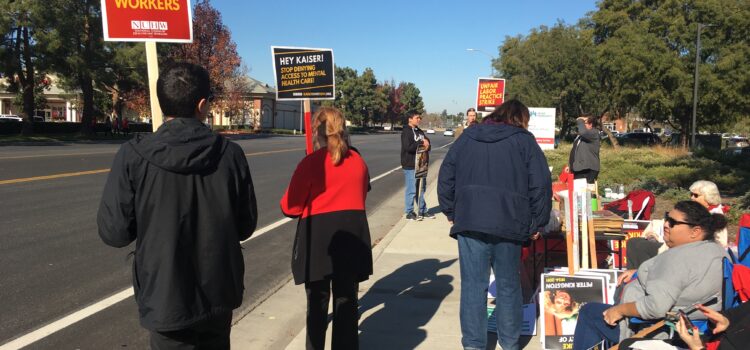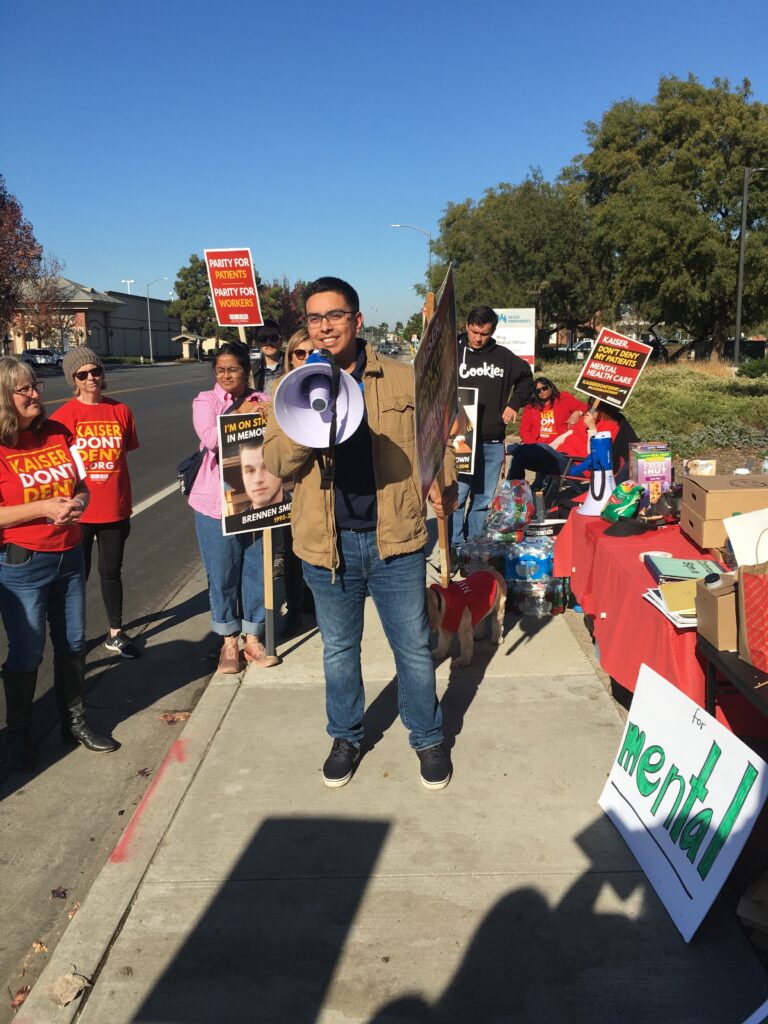
As part of a five-day statewide strike protesting Kaiser Permanente’s mental healthcare system, psychologists, social workers, psychiatric nurses and other healthcare professionals of the medical group in Bakersfield are raising awareness this week of the need for more mental health resources.
Nearly 4,000 Kaiser mental healthcare professionals across the state of California are demanding a fix to their mental healthcare system, which the National Union of Healthcare Workers (NUHW) described as “broken.” Kaiser employees say patients are left waiting months for appointments, and therapists have been overwhelmed with unsustainable caseloads.
“We’re striking because the problems that plague Kaiser’s mental health system keep getting worse,” said Kenneth Rogers, a Kaiser psychologist. “We don’t have enough time to provide proper patient care which includes the preparation and follow up work that goes into every appointment. And patients are being forced to endure even longer wait times for appointments, while Kaiser sits on billions of dollars refusing to fix the problem.”
Mental healthcare workers have asked Kaiser to soften their quota system to allow sufficient time to perform patient charting and other indirect patient duties; boost staffing so Kaiser can provide timely appointments to mental health patients; and to allow mental health employees to exercise clinical judgement over the type and frequency of care needed by their patients, among a few other requests.
The strike by Kaiser employees has the potential to shut down mental health services at more than 100 clinics and medical facilities, according to a press release from the NUHW.
However, Kaiser said in a statement that the hospitals and medical offices will remain open despite the strikes, and anyone in urgent need of mental health or other care will receive the services they require. But when necessary, they will call members to reschedule “non-urgent” appointments.
Kern Sol News reached out to the Bakersfield Kaiser for comment, but did not receive a response. In a statement, Kaiser is calling the NUHW’s strike “disruptive to patient access, operational care and service” and “irresponsible” considering this will be the sixth strike from NUHW within a single year.

Delano City councilman Bryan Osorio participated in the Bakersfield strike Monday in front of the Bakersfield Medical Center.
In 2013, Kaiser Permanente was fined $4 million and placed under a state-ordered monitoring program by the Department of Managed Health Care for violating California’s timely access rule and other mental health parity laws.
Since then, they were cited two more times, once in 2015 for failing a followup inspection, and again in 2017 for persistent problems. In 2017, Kaiser reached a settlement with the DMHC to hire an outside consultant for three years to improve access and oversight.
According to regulators at the DMHC, they report that Kaiser has been meeting the benchmark laid out in 2017, but professionals in the mental health field working with Kaiser say it’s not enough.
“Whether you’re a therapist and if you work for an organization like Kaiser, or if you’re in private practice, you only take on new patients when you can see them in the time frame they need to be seen,” said Susan Whitney, a licensed family and marriage therapist at Kaiser. “Which for most new patients you are seeing, it is every week or two. That’s the community standard.”
Whitney discussed that despite the numbers going up and Kaiser meeting the standard they’re supposed to be meeting, it did not mean their patients are getting the quality care they need for their mental health needs.
“Kaiser works really hard to get people in the door for the first appointment,” Whitney said. “So they focus all of their resources on getting people in right away.”
Because the clinicians are booked with new patients and their first appointments, other patients who need followup sessions are not able to get an appointment for six to 12 weeks, according to Whitney. She said she has an unlimited caseload with no cap and is uncertain about the number of patients she is responsible for.
“When I had a severe panic attack, Kaiser told me there would be a one-month wait to see a therapist,” said Jocelyn Combs, a Kaiser patient from Pleasanton. “At one point, I refused to leave the lobby until Kaiser helped me find a therapist, but the appointments were so infrequent, I eventually realized that I had to go outside Kaiser and pay for weekly therapy.”
Kaiser does contract with clinicians in the private sector; however, employees and patients say it’s just as difficult for patients to find availability to mental healthcare services because of the overwhelming number of patients under Kaiser Permanente.